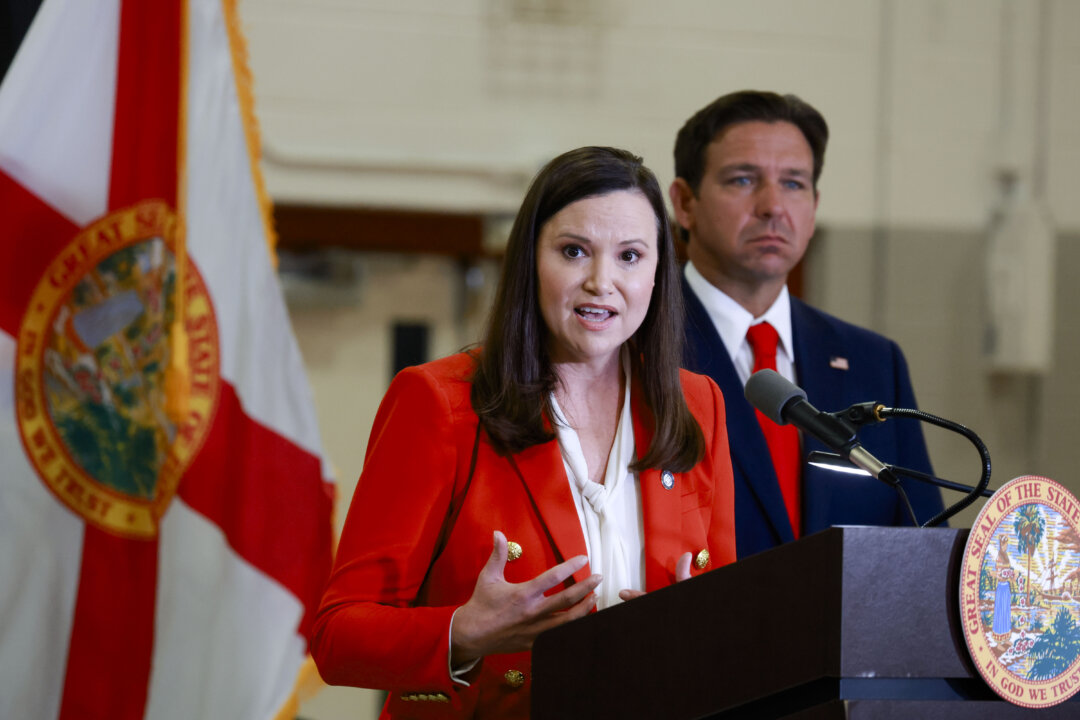‘Florida sues to vindicate its sovereign interest to investigate violations of state law,’ Ashley Moody said in her complaint.
The state of Florida is suing the U.S. Department of Justice (DOJ) for attempting to block its independent investigation into the assassination attempt on former President Donald Trump in West Palm Beach.
Florida’s Attorney General Ashley Moody filed a complaint against U.S. Attorney General Merrick Garland in the Southern District Court of Florida on Oct. 23, arguing the actions taken by the federal government are a violation of the 10th Amendment, and pose a “genuine threat” to Florida’s ability to investigate state law violations.
“These officials have stated that Florida may not conduct its own investigation, may not interview witnesses, and may only cooperate with the federal government’s investigation,” Moody writes in her complaint.
“Florida sues to vindicate its sovereign interest to investigate violations of state law, as delay may impact the outcome of any prosecution,” she wrote.
Moody’s complaint states the DOJ began impeding Florida’s investigation only a few days after Florida’s Gov. Ron DeSantis signed the Sept. 17 executive order announcing the statewide investigation.
FBI Special Agent in Charge Jeffre Veltri and other federal officials cited 18 U.S.C. § 351 (f), which states, “If Federal investigative or prosecutive jurisdiction is asserted for a violation of this section, such assertion shall suspend the exercise of jurisdiction by a State or local authority, under any applicable State or local law, until Federal action is terminated.”
Moody sent a letter to U.S. Attorney Markenzy Lapointe and FBI Director Christopher Wray for clarification on the DOJ’s intentions to invoke that legislation on Sept. 23.
Attempted assassination of a major presidential candidate is one of those violations covered by that federal law, but the charge was not added by federal prosecutors until Sept. 24.
Moody received a response from Lapointe on Sept. 30, saying the federal indictment adding the attempted assassination charge “resolves any potential uncertainty” about whether or not the legislation applies to the investigation.
Moody’s complaint said Lapointe’s response did not provide any further guidance on what the statute prohibits or how the federal government intended to enforce it.
Lapointe stated in her letter, “Congress plainly envisioned federal investigative and prosecutive primacy in the first instance for attempted assassinations such as occurred here, the same provision does not preclude state prosecutions permissibly following the conclusion of the federal prosecution.”
Two days later, the federal prosecutors requested an indefinite delay in the scheduling of Routh’s trial, citing the large amount of evidence needed to be reviewed by the prosecutors.
That request was denied by Judge Aileen Canon, but the Nov. 18 trial was still pushed back to Feb. 10, 2025, which prevented Florida from starting its independent investigation, as the state may not interview witnesses or execute warrants or subpoenas until the federal investigation and prosecution are concluded.
“Every day that Florida is prevented from investigating, the State’s case becomes harder to prove at trial,” Moody said. “By contrast, the federal government suffers no injury from Florida investigating state law crimes, as the State has no intention of interfering with or obstructing the federal investigation.”
Moody invokes the 10th Amendment, arguing that the DOJ’s reading of the law violates the amendment’s anticommandeering rule by attempting to dictate the actions of state officials.
Moody also noted concerns about perceived bias within the DOJ against the former president.
“The State of Florida has been clear that a dual-track investigation would be in the best interest of all parties involved,” Moody later said in a press release. “It is not lost on us that the American people have concerns about federal agencies exclusively handling this matter while simultaneously investigating and attempting to prosecute President Trump.
The Department of Justice declined The Epoch Times’ request to comment, deferring to 18 U.S.C. § 351 (f) and Lapointe’s response letter to Moody.

